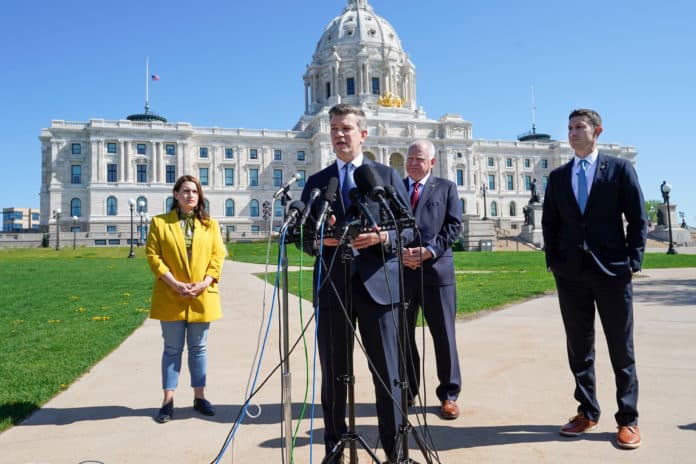
Minnesota’s top political leaders are proudly touting their plan to allocate the state’s more than $9 billion budget surplus before lawmakers have actually decided what to spend it on.
All that exists right now is a “broad framework” touted by Governor Tim Walz’s office and leadership in the legislature. This framework allocates $1 billion for education, $1 billion for health and human services, $450 million for public safety, $1.4 billion to local projects via a bonding bill and $1.3 billion towards a yet undefined category called “other areas as agreed by leaders.”
The agreement would devote $4 billion in tax relief while “leaving $4 billion on the bottom line to help the state manage future economic uncertainty,” per the governor.
The plan also outlines spending priorities beyond just the next year and drawing from projected tax dollars, not just the surplus. All in, the plan will cost over $15 billion across the next three years.
This entire framework is summed up on less than half a page of paper, signed by State Senate Majority Leader Jeremy Miller, State House Speaker Melissa Hortman and Walz.

While this plan does succeed in allocating the state’s budget surplus into extremely broad categories, it fails to explain exactly what it will be spent on, a task that now falls to the legislature. As the May 23rd end of session rapidly approaches, legislators are scrambling to make deals.
“There have been no final decisions on really anything at this point otherwise we’d have the bills done and on the governor’s desk,” Miller reminded his fellow legislators on Monday.
Leaders on both sides of the aisle are urging lawmakers to move faster.
“Focus on areas of agreement,” Miller told Republicans. “There is not much time to get this done before the end of session. Some of these larger bills need to be agreed to and wrapped up probably by Wednesday at the latest.”
Walz has also not expressed any desire to extend the decision making window.
“Deadlines are magical to what’s happening here; they are magical and they start to get things done,” Walz said.
State House Majority Leader Ryan Winkler, a Democrat is impressed by the progress that has already been made.
“We’ve accomplished more with Republicans in the Senate, with the governor, on a budget deal than we expected to be able to do it by this point in time,” Winkler said.
While Republicans and Democrats both entered negotiations upholding their typical party platforms, they have each made compromises. Republicans would have liked to see more money earmarked for tax relief, while Democrats wanted more spending on items like education, afforded by less relief.
Meanwhile, Republicans are hoping to solidify the gains they have made, remaining “focused on permanent, ongoing tax relief,” per Miller.










